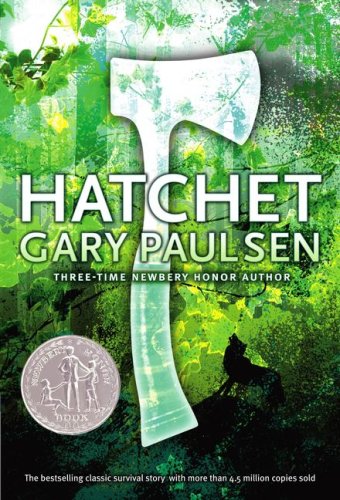SLIS 5420 Realistic Fiction
No More Dead Dogs
By Gordon Korman
Bibliography
Korman, G. (2000). No more dead dogs. New York:
Hyperion Books for Children.
Summary
Wallace Wallace has to help with the school play as his
punishment for writing a negative book report on a book called Old Shep. His argument being that not all dogs should
die at the end of novels about dogs. The
play he is forced to help on is an adaptation of the novel by his teacher.
He’s a star football player and because of the play, he
is unable to play on the team and they lose lots of games. He ends up taking over the play, much to Mr.
Fogelman’s chagrin, and the others like his suggestions and changes.
When his detention is over he decided to join the drama
club. Mysterious vandalisms occur and
Wallace is blamed. He is thrown out of the play, but everyone still in the play
want to use his suggestions, such as having a rock and roll band play and
letting Shep the dog live at the end. Wallace
isn’t allowed to be at the play and gets caught by his coach who lets it
slide. The vandal blows up Shep at the
end of the play right as they are praising the fact that he’s still alive. They all find out that it was Dylan, Rachel’s
brother who was mad at Wallace for leaving the football team.
Reviews
Clarke, J. (2001, Mar/Apr). No More Dead Dogs (Book Review). Book
Report, 19(5), 60.
This was one of the funniest books I
have ever read! The main character, Wallace, an eighth grader and a football
player, is well known for never telling a lie. His English teacher, Mr.
Fogelman, assigns the class to write a book review of his favorite book, Old
Shep, My Pal (1951). Wallace doesn't lie but says he thinks the book is awful;
besides, you know that the dog will die before starting page
one "because the dog always dies." This makes
Mr. Fogelman angry and he gives Wallace a detention. Wallace is to write and
turn in a good review. Detention ends up meaning that Wallace cannot play or
practice football until the proper "review" is written, and the
detention must be served with the drama club, which is directed by Mr.
Fogelman. Not only is Wallace extremely honest, he is very stubborn. The next
review he writes is still not acceptable, so he must continue coming to the
drama club practices as part of his "detention." Middle school kids
will enjoy this book because it is so typical of their language, actions, and
ideas. It would make a good book to read aloud to a class. Recommended.
Engelfried, S. (2005). No More Dead Dogs. School Library
Journal, 51(6), 57.
Gr 5-8-- Wallace Wallace always tells the truth, but when his book report
describes a classic as "the most boring book I've read," trouble
starts. The book turns out to be the basis for the equally boring school play,
and Wallace "improves" the performance by adding a moped, Rollerblades,
and a rock band. Wallace's unflinching bluntness in every situation sparks the
lively dialogue, and the final production of the play is both funny and
triumphant. Audio version available from Recorded Books.
My thoughts
This is a funny book. It’s written in different characters’ points
of view and each character “enters” like they are a part in a play which I
think is pretty clever.
How it could be used
Other books about dogs could be
brought in and the students could rewrite or act out the ending where the dog
lives.
Hatchet
By Gary Paulsen
Bibliography
Paulsen,
G. (1987). Hatchet. New York: Aladdin Books.
Summary
Brian
who is thirteen, is the only passenger on a flight to visit his father who is recently
divorced from his mother when the plane crashes because the pilot has a heart
attcck. This the story of the problems
he encounters using only his hatchet as a means to survive. He tries to kill a porcupine, only to be shot
by its quills; he is sprayed by a skunk; he’s attacked by a moose and he also
tries to commit suicide without success.
He is able to catch fish to eat, but his failed suicide attempts make
him determined to take care of himself.
In the end he is sitting down to eat a freeze-dried meal when a plane
rescues him due to his finding an “Emergency Transmitter” he has worked with
but decided it didn’t work.
Reviews
Reutter,
V. (2004 May). Hatchet (Book). School Library Journal, 50(5), 64.
Gr
5-8-- This
model survival story of a plane crash in a lake strands 15-year-old Brian alone
in the Canadian wilderness for 54 days. Emotional wounds are healed as he
struggles to overcome hunger, wild animals, and a tornado. Paulsen's
visual writing style and attention to detail are drawn from his own experience
and affinity for the woods. Audiobook available from Listening Library.
Horn Book (Spring 2008)
This handsome large-format
twentieth-anniversary edition features a new introduction and conversational
sidebars written by Paulsen that personalize some of the novel's material.
Naturalistic sepia-tone drawings are lovely but would be better suited to
illustrate a nature journal than a survival story. Readers may be put off by
the book's large size, but teachers will especially appreciate the additional
content.
My
thoughts:
I got tired of all the struggles and
tragedies he went through. I was ready
for some good things to happen to him, but he seemed to have lots of bad luck.
How
it could be used in the library
This could be an introduction to a
camping/survival discussion.

No comments:
Post a Comment